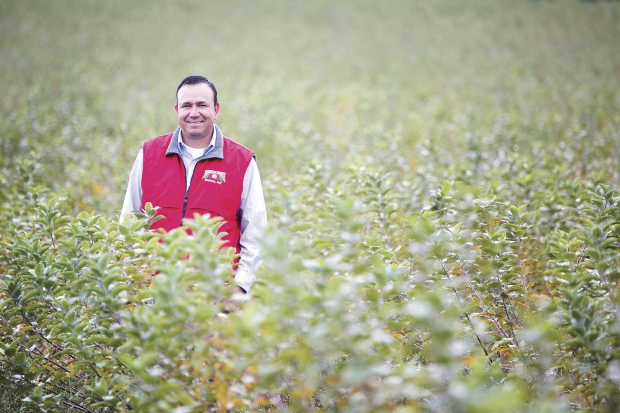
José Ramirez, from Stein Manzana Orchards, at his orchard near Royal City, Washington, on November 3, 2014. (TJ Mullinax/Good Fruit Grower)
When José Ramirez was a child in Mexico he dreamed of going to the United States and becoming rich and famous.
Though it’s not quite what he envisioned when he used to watch American movies, Ramirez has made a name for himself in the Washington tree fruit industry.
At the Washington State Horticultural Association’s annual meeting this month, he will receive the Latino Leadership Award, one of the industry’s top honors.
His philosophy has always been that you can’t wait for things to happen around you. You have to make them happen.
Ramirez and five siblings grew up in a village in the state of Guanajuato where his family grew corn and beans. The village school only went up to fourth grade, so he did fifth and sixth grade (which he completed in one year) at a school nine miles away, traveling there and back by donkey.
When he was 11, knowing his family was struggling, he left school to work on the farm. His father, Aurelio, had a couple of horses and a wagon and would transport people to town for a fee. Sometimes, the job fell to young José. The wagon’s brakes didn’t work well, so on downhill stretches the horses just had to run faster and faster, with José hanging on for his life.
“It was fun—and dangerous,” Ramirez recalled, “But you don’t see it that way when you’re living in those situations.”
In 1985, at the age of 17, Ramirez decided to pursue his dream and left Mexico for Vista, California, where he got a job picking strawberries. Bending over the whole day long pushing a small cart and picking the fruit made his hamstrings hurt and his feet numb.
When a representative of a farm labor contractor came looking for people to go work in Washington State, Ramirez paid his money and got in the car.
“It was kind of an adventure,” Ramirez recalls. “My idea was to get rich quick and go back home.”
Royal City
Ramirez and several more workers were dropped off at a partially burned down house at Manzana Orchard in Royal City, where they lived for a few days. Fearing it was unsafe, they moved into the farm shop. When the weather turned too cold, they had to look for proper housing.
Ramirez worked at the orchard’s packing house until the bank foreclosed on the business in 1987. Sunfresh, Inc., ran the orchard for a year. Then current owner Keith Stein of Idaho bought the orchard, which he renamed Stein-Manzana, and began replanting and expanding. Ramirez got a job as a laborer and had a second job in the evenings at a potato packing plant at Warden. At the orchard, he was soon promoted to tractor driver, then assistant crew boss, and crew boss. In 1994, Stein bought two more Columbia Basin orchards, Silver Hawk and Quail Ridge. Ramirez was transferred to oversee those orchards.
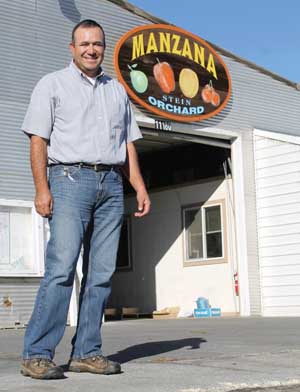
José Ramirez, started as a laborer at Stein-Manzana Orchard in Royal City and worked his way up to tractor driver, assistant crew boss, crew boss, and eventually orchard manager. (Geraldine Warner//Good Fruit Grower)
When the orchard manager at Stein-Manzana left, the company advertised the position and hired someone to do the job. Ramirez said since he had little education, the owners probably thought he wasn’t capable of doing it. But the person they hired backed out, finding the thought of managing 300 acres with 13 different varieties of pears and 12 apple varieties, along with peaches and nectarines, too overwhelming.
Dain Craver, then a consultant and now general manager of Stein-Manzana, told Stein that the best candidate was already working for him at his other orchards.
“I kept pushing for José,” Craver recalled. “I told them, ‘You’ve got a great guy here in José Ramirez. He’s got good tree sense, and we can teach him all the computer stuff.’”
Ramirez took the job, decided he wasn’t going back to Mexico any time soon, and began learning English at Big Bend Community College in Moses Lake. He gained legal status in this country through the Immigration Reform and Control Act of 1986, which granted amnesty to certain seasonal farm workers who were here illegally.
A couple of years later, he took the first Hispanic Orchard Employee Education Program class that Wenatchee Valley College held in Quincy, which taught basic horticulture, English, and math. He then did the more in-depth second level of the program as well as further HOEEP classes about orchard management, tree physiology, and pest management. The classes helped him understand why things were done, not just how.
“Everything started gelling,” Ramirez said. “It made sense.”
He went on to help the Washington State Department of Agriculture with their pesticide safety workshops and gave talks at the Hort Association’s Spanish-language sessions at the annual meetings.
Ramirez now oversees a year-round crew of about 30 people at Stein-Manzana.
“I have people working for me for over 20 years now, and they came the same way I did,” he said. “Some are my assistants, and some are people I really depend on. I tell the guys this is an opportunity to succeed. It’s a good thing. It’s not a bad thing, because it’s preparing yourselves.”
Thanks in large part to his tutelage, some of his employees have gone on to manage other orchards.
“I don’t like to lose people,” Ramirez added. “But if they have an opportunity to move on to better things, I don’t have a problem with that. It’s the way of life. My focus and energy in life is to help and have someone benefit.”
Own orchard
As Ramirez worked in the tree fruit industry, his dream gradually changed from being rich and famous to owning an orchard. In 2007, he had an opportunity to buy an 80-acre parcel of land at Royal City with water rights for 64 acres. Ramirez and his wife, Rosa, put their life savings into it and obtained low-interest loans for beginning farmers from the U.S. Department of Agriculture. He has 34 acres of orchard planted with Honeycrisp, Gala, Red Delicious, and Fuji and is growing nursery trees there in collaboration with Craver.
He’s found it time-consuming to have a full-time job as manager and farm his own place in the evenings and weekends. It leaves little time to be with his wife and their four children, Nelson (15), Alex (13), Kevin (8), and Rosa Lynn (6).
“It changes your perspective for sure,” said Ramirez, who now has an employee of his own and tries to treat him the best way possible.
Representing Hispanics
Despite his limited free time, Ramirez serves on several community and industry boards.
In 2004, Jim Hazen, then executive director of the Hort Association, asked him if he would take a position on the association’s board.
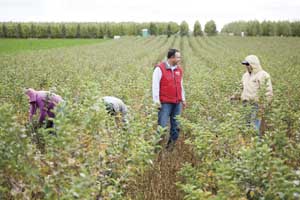
José Ramirez hopes to represent Hispanics and small farmers on the new Washington State Tree Fruit Association board. (TJ Mullinax/Good Fruit Grower)
“It was a pretty big thing,” Ramirez said. The only other Hispanic person to serve on the board was Mario Martinez, horticulturist for Washington Fruit and Produce Company.
“I feel that if you want things to happen, you can’t complain,” he said. “You need to get involved, and you can understand a little better how things happen.”
Five years ago, West Mathison, then Hort President, asked Ramirez if he would take the second-vice-president position, with the idea that he would move through the ranks to president. He would have succeeded Steve Zediker as president at the 2014 annual meeting, had the association not become part of the new Washington Tree Fruit Association. Elections for the board of the new association are being held this month. Jeff Cleveringa, chair of the nominating committee, asked Ramirez if he would be nominated for a position.
“I said, ‘If you think I can help, and if I can represent not only the Hispanics but the small growers, I’m willing to give it a try,’” Ramirez said. “I think they want Hispanics to come out of their shell and become more involved. By having me involved in the industry, they have a face that other people can relate to.
“Sometimes you feel a bit nervous that your opinion doesn’t matter,” he added. “But I find the little you can say goes a long way. It has an impact. People take it seriously.”
Though it’s not the kind of fame or fortune he dreamed of back in Mexico 30 years ago, Ramirez said he feels fortunate to be part of the tree fruit industry.
“If you have a dream and you want to go and work for it, it’s something you can accomplish.” •
___________________
Working his way up
José Ramirez, orchard manager at Stein-Manzana Orchard in Royal City, Washington, will receive the Latino Leadership Award at the Washington State Horticultural Association’s annual awards banquet in Kennewick on December 2.
Leo Garcia, director of bilingual agricultural education programs at Wenatchee Valley College, has known Ramirez since 1997 when Ramirez took the Hispanic Orchard Employee Education Program in Quincy. At the time, he spoke little English.
“I’ve always admired José for who he is as an individual and who he represents,” Garcia said. “You have to look at where he started and where he is now. It’s easier when your parents pay for college and you become a doctor, but think about people who are almost from the very bottom and work their way up to be respected by their peers. He can really talk to any of the people in the industry and hold his ground very well.”
Garcia said Ramirez, who lives in Moses Lake, is a leader in the community. He sits on the area hospital board and the weed control board in Royal City.
He’s also respected by the employees he manages and makes sure all the full-time employees have access to education.
“It’s pretty amazing,” Garcia said. “I feel really proud to be one of his friends and to get to know and associate with people like that.”
Karen Lewis, Washington State University extension specialist, said Ramirez has been a champion for farmworker education and has played an integral role in the educational efforts of organizations such as WSU, the Hort Association, Washington State Department of Agriculture, and Wenatchee Valley College.
“He knows that education is fundamental in being successful in this industry and in your community,” she said. “He walks the walk.”




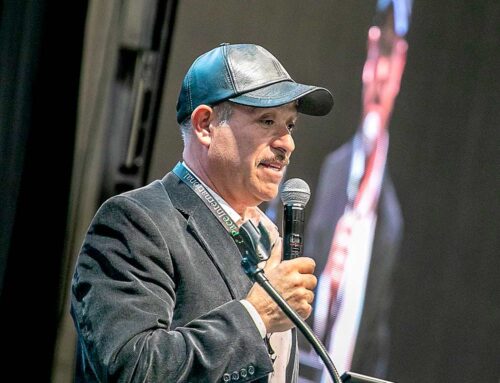
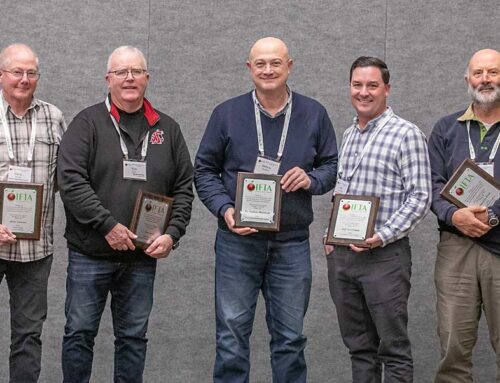
Great story about Jose, Geraldine!